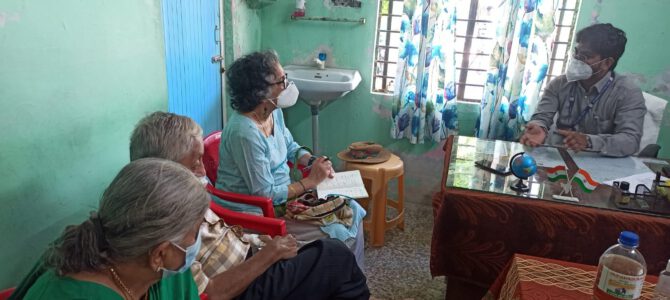I(Prof. Shyama V. Ramani) have been in Kameswaram village in Nagapattinam district for one week. I am here to do research on data governance. Kameswaram is a village with only those households classified as marginalized (in past or present) by the Indian Government. Yet, there is enormous income inequality. There are palatial houses next to huts. I am not aware of anyone paying taxes, though all households are into some form of chit fund schemes run by micro-finance institutions. Like in other villages, there are about 100 self-help groups – all are focused only on money exchanges via micro-finance institutions. Nothing else!
The health of many people is poor – especially women. Everyone complains of getting headaches often. It’s not the poverty – as people do have enough to eat. It’s not the tadpoles or the snakes (yesterday I saw one slithering into the neighbor’s yard). Chemicals that the farmers (especially the rich ones who don’t live here) spray on their fields are only part of the problem. Finally, it’s not even the heat – which is tolerable given the proximity to the sea. At night one can fall asleep on the balcony gazing at the stars. I think one of the major problems is NOISE POLLUTION. Indeed, I can confirm from personal experience that it is absolutely impossible to get eight hours of sleep at a stretch even once a week in this village. The ladies tell me that it’s the same everywhere.
The last two days (and nights) there has been enormous noise, from 6 PM till midnight, from a wedding on the street. Then places of worship temples, churches, and mosques compete with one another to blare out to the poor faithful from 3.30 AM onward, at 15 to 20-minute intervals till 6 AM. This is again an outcome of the electronics and telecommunications revolution that marks our digitally transformed world. “I am already tired of the crowds and noise during the day” explained the priest of one temple, “thankfully we can program our loudspeakers every day and set different chants, lectures, and music to play for multiple hours”. His wife added, “We live away for health reasons. I cannot farm without sleep.”
A person came to ask for donations, “We are not getting enough people – as the next ward’s temple’s speaker amplifiers are more powerful. So let them not beat us – give us funds to invest in speaker systems.”
An old woman told me, “Before living near places of worship used to be considered a good thing. Now, for me, places of worship are representations of hell. I am a Hindu-Christian and I dread December (auspicious here for both). There is a church as well as a temple near my house, and they compete with one another to be louder throughout the day and night. I tell you – I am going to die only in December. I hope to die soon.”
The laborer cutting the weeds nearby laughed, “That’s why I feel lucky to be a man. I need my sleep – and the only way I can get sleep is to get drunk. I live near a mosque and a temple – and it would be impossible to sleep otherwise.”
One of the ladies assured me, “You will get used to it. We have learned to adjust between light sleep and little sleep. Another week – you will be able to wake up multiple times and get up in the morning and do your research.”
So, men drink, women suffer – and I don’t know how children and youth can study and focus without sleep. Drinking causes road accidents. Lack of sleep lowers immunity and increases aggression. There should be a regulation passed in India, especially in the villages where the majority live, that while the faithful can sing and chant in the temples (which they are not encouraged to do now), no electronic equipment and loudspeakers can play pre-recorded music or speeches at any time. These should be banned from places of worship. There is sufficient noise pollution during the day due to traffic, festivities, and hawkers who now do not cry out, but vend their fares using very loud loudspeakers.
Tonight, maybe I will book myself in a fancy hotel in the nearby town of Velankanni, after confirming the possibility of having a sound sleep – i.e. ensuring that it is sufficiently far away from any loudspeakers of places of worship. This is an economic privilege I have as a researcher from the United Nations University, UNU-MERIT. But, is this not an unfair entitlement? Even if the villagers are used to working under the hot sun with intermittent and light sleep, surely it will have a negative impact on their health. It is very morally wrong to deny the poor even access to sleep. They do not have the luxury of sleeping indoors with double-sealed windows to the gentle buzz of their air-conditioners. It is imperative to facilitate deep and sound and adequate sleep for all citizens.
Noise pollution from households, shops, hawkers, and places of worship is something we can lower very easily through appropriate regulation. Such a ban would have an enormous positive impact on citizens’ health in India. And maybe it will bring back the faithful to the places of worship so that they ring out the wonderful voices of humans and instruments, rather than blare out pre-recorded music, chants, and lectures at times when the human body should be recovering through deep slumber.


